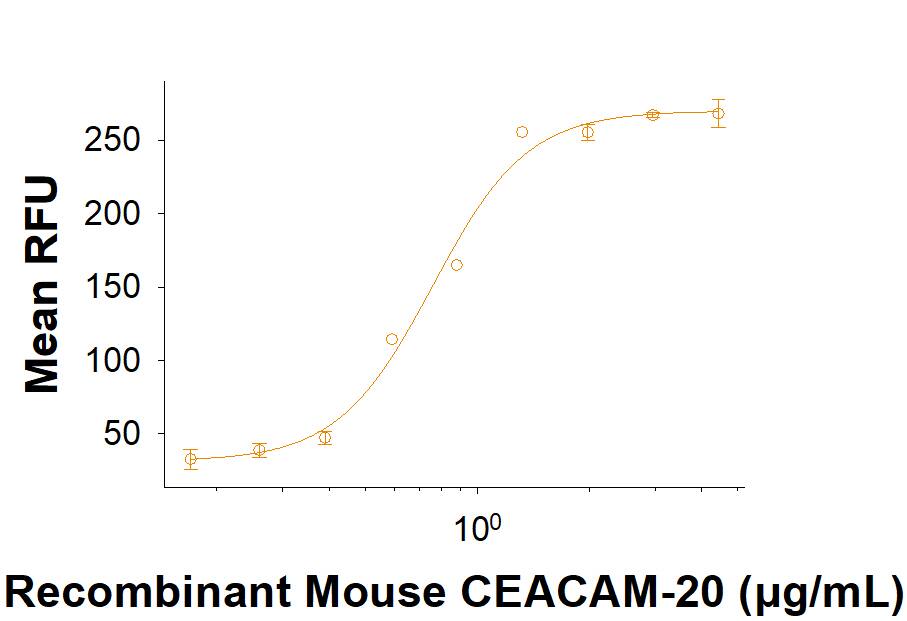Recombinant Mouse CEACAM-20 His-tag Protein, CF
R&D Systems, part of Bio-Techne | Catalog # 10953-CM

Key Product Details
Product Specifications
Source
Mouse myeloma cell line, NS0-derived mouse CEACAM-20 protein
His31-Ala430
His31-Ala430
Purity
>95%, by SDS-PAGE visualized with Silver Staining and quantitative densitometry by Coomassie® Blue Staining.
Endotoxin Level
<0.10 EU per 1 μg of the protein by the LAL method.
N-terminal Sequence Analysis
His31
Predicted Molecular Mass
45 kDa
SDS-PAGE
63-73 kDa, under reducing conditions.
Activity
Measured by the ability of the immobilized protein to support the adhesion of the L Cells mouse fibroblast cell line.
The ED50 for this effect is 0.300-1.50 μg/mL.
The ED50 for this effect is 0.300-1.50 μg/mL.
Scientific Data Images for Recombinant Mouse CEACAM-20 His-tag Protein, CF
Recombinant Mouse CEACAM-20 His-tag Protein Bioactivity.
Immobilized Recombinant Mouse CEACAM-20 His-tag Protein (Catalog # 10953-CM) enhances L cells mouse fibroblast cell line adhesion. The ED50 for this effect is 0.300‑1.50 μg/mL.Recombinant Mouse CEACAM-20 His-tag Protein SDS-PAGE.
2 μg/lane of Recombinant Mouse CEACAM-20 His-tag Protein (Catalog # 10953-CM) was resolved with SDS-PAGE under reducing (R) and non-reducing (NR) conditions and visualized by Coomassie® Blue staining, showing bands at 63-73 kDa.Formulation, Preparation and Storage
10953-CM
| Formulation | Lyophilized from a 0.2 μm filtered solution in PBS. |
| Reconstitution | Reconstitute at 500 μg/mL in PBS. |
| Shipping | The product is shipped with polar packs. Upon receipt, store it immediately at the temperature recommended below. |
| Stability & Storage | Use a manual defrost freezer and avoid repeated freeze-thaw cycles.
|
Background: CEACAM-20
References
- Tchoupa, A. et al. (2014) J Cell Commun Signal 12:27.
- Zhang, H. et al. (2013) PLoS ONE 8:e53359.
- Zebhauser, R. et al. (2005) Genomics 86:566.
- Beauchemin, N. Arabzadeh, A. (2013) Cancer Metastasis Rev 32(3):643.
- Kuespert, K. et al. (2006) Curr Opin Cell Biol 18:565.
- Murata, Y. et al. (2015) PNAS E4264-4271.
- Chang, C.L. et al. (2013) PLoS One. 8:e61701.
- Horst, A.K. and Wagener, C. (2004) Handb Exp Pharmacol 283-341.
- Kitamura, Y. et al. (2015) Genes to Cells 20:578.
- Kotani, et al. (2016) Expert Review of Gastroenterology & Hepatology. 10:1313.
Long Name
Carcinoembryonic Antigen-related Cell Adhesion Molecule 20
Alternate Names
CEACAM20, GPAD9366, UNQ9366
Gene Symbol
CEACAM20
UniProt
Additional CEACAM-20 Products
Product Documents for Recombinant Mouse CEACAM-20 His-tag Protein, CF
Product Specific Notices for Recombinant Mouse CEACAM-20 His-tag Protein, CF
For research use only
